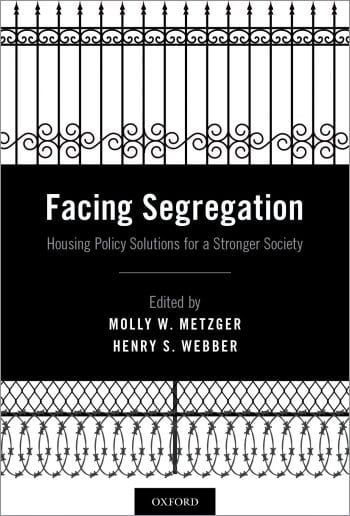Fifty years after the passage of the Fair Housing and Civil Rights Acts, a new book ̶ “Facing Segregation: Housing Policy Solutions for a Stronger Society” ̶ brings together influential scholars, practitioners and policy analysts to reflect on how to use public policy to reduce segregation.
The 280-page volume, released December 3 from Oxford University Press, focuses on achievable solutions. Editors Molly W. Metzger, PhD, and Henry S. Webber, MPP, have gathered the field’s first collection of prescriptions for what ought to be done.
Authors present arguments for new policy actions ranging from local innovations to national initiatives.
“Segregation harms us all, not just those residing in disadvantaged communities,” Metzger and Webber write in the opening chapter.
“It stifles economic growth in our metropolitan areas, threatens the functioning of our democracy, and calls into question fundamental ideals—such as the principle of equality of opportunity—that contribute to many Americans’ definition of what makes our country great.”
Metzger is assistant professor in the Brown School at Washington University in St. Louis and faculty director for Inclusive Housing at the Brown School’s Center for Social Development. Her research focuses on public policy, structural racism, and residential segregation in the United States. A community-engaged scholar, she works with housing advocates in the St. Louis region to bring an evidence-based approach to activism. She also is lead author of the paper “Fair Housing and Inclusive Communities: How Can Social Work Move Us Forward?” for the national Grand Challenge for Social Work initiative to achieve equal opportunity and justice for all.
Webber is executive vice chancellor and chief administrative officer at Washington University. He is also professor of practice at the Brown School and the School of Architecture and Urban Design. His research and writing center on community development, mixed-income housing, racial and economic segregation, and the role of anchor institutions in urban development.
In addition to Metzger and Webber, 12 authors contributed to the volume: Sarah L. Coffin, Mark L. Joseph, Lance Freeman, Jason Q. Purnell, Richard Rothstein, Barbara Sard, Michael Sherraden, Josh Silver, Todd Swanstrom, William F. Tate IV, John Taylor, and Philip Tegeler.
The authors suggest a variety of strategies:
- Enforcing housing antidiscrimination laws
Locating Low-Income Housing Tax Credit projects in low-poverty areas or near high-quality schools - Making housing vouchers more useful by assisting families to locate in high-opportunity areas, modifying policies to discourage voucher use only in lower-poverty communities, and minimizing jurisdictional barriers to using vouchers
- Interpreting the Community Reinvestment Act to support mixed-income housing in both cities and suburbs
- Promoting scattered-site rehabilitation and preservation of affordable housing in high-income neighborhoods through nonprofit-owned affordable housing or community land trusts
- Adding inclusionary zoning requirements to development incentives
- Eliminating local zoning rules that make affordable housing impossible—for example, rules specifying minimum lot sizes.
“I have come to view segregation as America’s most fundamental social problem,” Sherraden writes in the forward. He is the George Warren Brown Distinguished University Professor at Washington University and founding director of the Center for Social Development. “Many other challenges—in education, employment, public services, transportation, health, crime, and civic engagement—are exacerbated by racial and class segregation.”
Toni L. Griffin, professor in practice on urban planning at Harvard University, said “Facing Segregation” reintroduces readers to “how our country’s housing policies intentionally manufactured segregation to retain race and class hierarchies, a legacy that our neighborhoods still reflect 154 years removed from a race-based servitude economy.”
Paul C. Brophy, principal at Brophy & Reilly LLC, said the volume “makes a brilliant and comprehensive case for why continuing racial and economic segregation is harmful to the nation, and promotes policies that can be effective in creating more inclusionary communities, ones that benefit all Americans.”
To order “Facing Segregation,” see Oxford University Press.